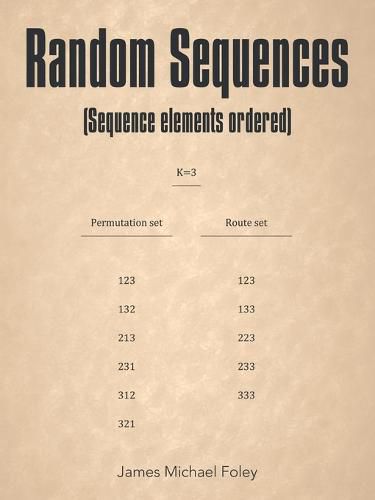Readings Newsletter
Become a Readings Member to make your shopping experience even easier.
Sign in or sign up for free!
You’re not far away from qualifying for FREE standard shipping within Australia
You’ve qualified for FREE standard shipping within Australia
The cart is loading…






This title is printed to order. This book may have been self-published. If so, we cannot guarantee the quality of the content. In the main most books will have gone through the editing process however some may not. We therefore suggest that you be aware of this before ordering this book. If in doubt check either the author or publisher’s details as we are unable to accept any returns unless they are faulty. Please contact us if you have any questions.
Consider a set of k elements. Let the elements be the first k positive integers. Consider the permutation set that corresponds to the first k positive integers - and let each element's order equal that element's value.
At every line of the permutation set, there exists an element or there exist the elements of the greatest order so far while doing a left-to-right scan. As a consequence, six permutation set properties exist. Expectations and expected values corresponding to the properties are calculated.
Then the order of the elements is generalized. An equal order constraint can be applied so that selected elements of adjacent order are reassigned the lowest order of the elements of adjacent order. Then multiple equal order constraints can be applied concurrently. Then all possible equal order constraints are considered.
Permutation sets are used to express random sequences. Equal order constraints are applied to the elements of the permutation sets. Values of permutation set properties are calculated and mathematical patterns are discerned. Consequently, the interaction of order and random sequences is determined.
$9.00 standard shipping within Australia
FREE standard shipping within Australia for orders over $100.00
Express & International shipping calculated at checkout
This title is printed to order. This book may have been self-published. If so, we cannot guarantee the quality of the content. In the main most books will have gone through the editing process however some may not. We therefore suggest that you be aware of this before ordering this book. If in doubt check either the author or publisher’s details as we are unable to accept any returns unless they are faulty. Please contact us if you have any questions.
Consider a set of k elements. Let the elements be the first k positive integers. Consider the permutation set that corresponds to the first k positive integers - and let each element's order equal that element's value.
At every line of the permutation set, there exists an element or there exist the elements of the greatest order so far while doing a left-to-right scan. As a consequence, six permutation set properties exist. Expectations and expected values corresponding to the properties are calculated.
Then the order of the elements is generalized. An equal order constraint can be applied so that selected elements of adjacent order are reassigned the lowest order of the elements of adjacent order. Then multiple equal order constraints can be applied concurrently. Then all possible equal order constraints are considered.
Permutation sets are used to express random sequences. Equal order constraints are applied to the elements of the permutation sets. Values of permutation set properties are calculated and mathematical patterns are discerned. Consequently, the interaction of order and random sequences is determined.